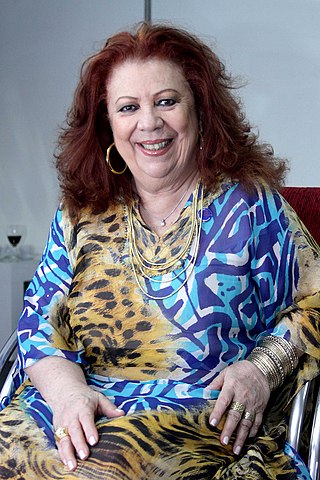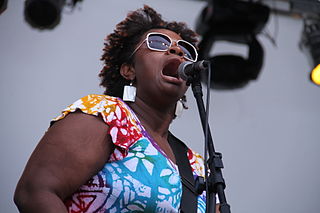
Daniela Mercury is a Brazilian singer, songwriter, dancer, and producer. In her solo career, Mercury has sold over 11 million records worldwide, and had 24 Top 10 singles in the country, with 14 of them reached No. 1. Winner of a Latin Grammy for her album Balé Mulato – Ao Vivo, she also received six Brazilian Music Award, an APCA award, three Multishow Brazilian Music Awards and two awards at VMB: Best Music Video and Photography.

Priscilla Novaes Leone, better known as Pitty, is a Brazilian rock singer.

Zélia Gattai Amado de Faria was a Brazilian photographer, memoirist, novelist and author of children's literature, as well as a member of the Brazilian Academy of Letters. Gattai wrote 14 different literary works, including children's books and her own personal memoirs have been widely published.

Ivete Maria Dias de Sangalo is a Brazilian singer-songwriter, TV host, and occasional actress. She was on six albums with Banda Eva, and seven more solo albums. Sangalo is noted for her powerful contralto voice, charisma and live performances. Her music is also popular in Portugal. She has sold 25 million copies of her albums and won 4 Latin Grammy Awards

Leci Brandão is a Brazilian politician, singer and composer of Brazilian Popular Music. She is the daughter of Pérola Negra, one of the artists who pioneered in making the Brazilian pagode music popular throughout the land. Her performance of "Quero Sim" won the National Meeting of Samba Composers in 1973.

Elizabeth "Beth" Santos Leal de Carvalho was a Brazilian samba singer, guitarist, cavaquinist and composer.

Simone Bittencourt de Oliveira, better known as Simone, is a Brazilian singer of Música Popular Brasileira (MPB) who has recorded more than 30 albums.

Fafá de Belém, born Maria de Fátima Palha de Figueiredo in Belém do Pará on August 9, 1956, is a Brazilian singer considered one of the great female singers of MPB. She took her stage name from the city of her birth and in addition to a successful recording career that spans over three decades, it is fair to say that she has been one of the great sex symbols of Brazilian pop music. Her husky mezzo-soprano voice is known for its extensive emotional range, from tender ballads, to sensual love songs, to Portuguese fados all the way to energetic sambas and lambadas.

Zélia Duncan, born Zélia Cristina Gonçalves Moreira, is a Brazilian singer-songwriter.

Cláudia Cristina Leite Inácio is a Brazilian singer and television personality. She rose to fame in late 2002 as the lead vocalist of the Axé music group Babado Novo. The group achieved a string of consecutive diamond-certified hit singles in Brazil and five golden and platinum albums from 2003 to 2007, as granted by the Brazilian Association of Record Producers (ABPD).

Jacobina is a city in the Centro Norte Baiano mesoregion of Bahia. It was founded July 28, 1722 and the population is 82,590. The town is surrounded by mountains, hills, lakes, rivers, springs, and waterfalls. Located in the northwest region of Bahia, in the extreme north of the Chapada Diamantina, Jacobina is 330 kilometers from Salvador and is also known as 'City of Gold', a legacy of the gold mines which attracted the pioneers from São Paulo in the early seventeenth century.

Sandy Leah Lima, known mononymously as Sandy, is a Brazilian singer-songwriter and actress. Born and raised in Campinas, Sandy began her career in 1989, when she formed with her brother, musician Junior Lima, the vocal duo Sandy & Junior. They rose to fame in the early 1990s as child stars and reached the height of their success during teenage, as albums Era Uma Vez... Ao Vivo (1998), As Quatro Estações (1999), Quatro Estações: O Show (2000) and Sandy & Junior (2001) sold more than a million units, with the second and third being among the best-selling albums of all time in Brazil. The duo were credited with leading a wave of teen pop artists during the late 1990s and early 2000s, with the press labelling Sandy the Brazilian "Princess of Pop". The duo disbanded in 2007 and released their Acústico MTV in September that year. In addition to their success in the music industry, the sibling's name became a strong brand, with more than 300 licensed products which made R$300 million a year.

Simone Saback is a Brazilian composer, writer, screenwriter, poet and journalist.

The albums discography of Brazilian singer-songwriter Ivete Sangalo consists of seven studio albums, three live album, seven compilation albums, one extended play and five video albums. In 1993, Sangalo began her career as lead singer of Banda Eva, the most successful Brazilian axé music band, and released six studio albums, one live album and two compilation albums.

Ellen Gomes de Oléria, known as Ellen Oléria is a Brazilian singer, musician, songwriter, and actress.

Flávio Hugo Venturini is a Brazilian singer and songwriter.

Ana Montenegro was a Brazilian author, journalist, activist, editor, and poet. She was a militant communist and lived in exile for more than 15 years after the 1964 coup. She was a lawyer who advised on human rights and women's rights issues and actively fought against racism. She wrote extensively on women's issues, from their health to their socio-economic rights; the legal-cultural struggle of blacks against racism; and the struggles of urban and rural workers to gain their rights under the Constitution. After returning from exile, she was honored by her local bar association, her state, and the nation of Brazil for her human rights work. In 2005, she was one of the 1000 women nominated for the Nobel Peace Prize.
Voz da Verdade is a Brazilian contemporary Christian band. It was founded in 1978. The group is part of Ministry of the Voice of Truth, a religious institution. Voz is one of the most active religious bands in Brazil, with a 35-year career and has sold over five million units among LPs, CDs and DVDs.

Marília Dias Mendonça was a Brazilian singer, songwriter and instrumentalist, posthumously recognized in Brazil as the Queen of Sofrência, a subgenre of sertanejo music, and has been recognized for her contribution to female empowerment by revolutionizing the universe of sertanejo music.

The House at Rua da Matriz, no. 9 is a historic residence in Santo Amaro, Bahia, Brazil. It is also known as the House at the Praça da Purificação, 9 or Sobrado de Bijú. It is an urban sobrado, or manor house, of the 19th century. Like other Bahian urban sobrados and convents of the period, it has a belvedere. It is located within the Historic Center of Santo Amaro, and is one of many historic structures surrounding the Praça da Matriz. The house is located on the square and looks out towards Parish Church of Our Lady of Purification. It now functions as the State University of Santo Amaro, Campus Avançado de Santo Amaro. It was listed as a historic structure by the National Institute of Historic and Artistic Heritage in 1943.



















